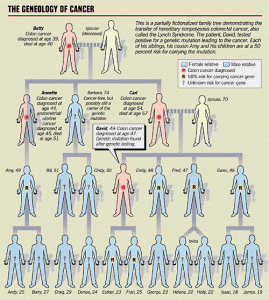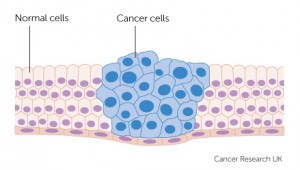A disease that attacks and breaks down your body tissue when the cells in your body divide at a rapid pace. I have briefly looked into this over the past few years because I was concern for myself. The reason behind my concern was because four of the five men on my father’s side had cancer in the past. My grandfather passed away from lung cancer in 1983, my uncle passed away in 2009 from a brain tumor that he fought for four years, my dad was diagnosed with head and neck cancer in the fall of 2010, and my uncle had skin cancer in 2012. Cancer can be due to chance alone as many know, but other times it can be due to how you treat your body and how you manage your health. My mother’s dad has never been affected nor have her two brothers, the women on both sides have never had any scares either. So that really got me thinking that, what if there is a male gene on my father’s side that can trigger the disease. Although all of the cancers were different I was still curious if there was any possibility that cancer could be linked with genetics.
An article from Coriell Collaborative written by J. Chakma back in 2008 discussed the three different ways that someone could end up being diagnosed with cancer. Sporadic cancers are the most common, but have no link to the patient’s genetics. Familial cancers are cancers that happen to be linked to your genetics but your surroundings could also contribute to the cause. These two factors work together in forming cancerous cells, the cancerous cells that are inherited are correlated with the factors of your environment. Although genetics is included, this type of cancer is uncommon among your inheritance. Hereditary cancers are the third type; these type of cancers are very uncommon but still have the possibility of affecting someone who has the gene passed down. The gene is only likely to have cancerous connections, only a very small percent of cases is caused by the gene becoming cancerous. The gene still has a high chance of being passed down through inheritance but only if it is passed down through an autosomal gene.
contribute to the cause. These two factors work together in forming cancerous cells, the cancerous cells that are inherited are correlated with the factors of your environment. Although genetics is included, this type of cancer is uncommon among your inheritance. Hereditary cancers are the third type; these type of cancers are very uncommon but still have the possibility of affecting someone who has the gene passed down. The gene is only likely to have cancerous connections, only a very small percent of cases is caused by the gene becoming cancerous. The gene still has a high chance of being passed down through inheritance but only if it is passed down through an autosomal gene.
Although you may obtain a cancer gene, that does not mean you are surely to get it, it’s only likely, but you are still at risk. You could also have no links to cancerous genes but still end up getting it, for example if you smoke you could be at risk for lung or neck cancer. It is a fact that all cancers are genetics, but it is unknown as to which cancers can be hereditary. Having a cancer gene does not always but you at risk of the disease, but when that gene spreads and affects all of your cells it then becomes cancerous. Studies have found that some types of cancers are more likely in certain families than others, such as breast cancer. Lung cancer is due to chance, but can be triggered by the status of your surroundings. When cells are affected by cancer, tumors are formed, but not all tumors are considered cancerous. A tumor that is malignant is harmful and corrupts the tissue that surrounds the tumor. A benign tumor is one that does not form around tissue but can affect other parts of the body such as blood vessels. It is still important to treat both cases with extreme caution since they can both have dangerous effects, treatment options vary among the type of cancer as well as the patients. Everyday researchers are working to find a way to find an easier and less complex way of treating cancer, since every patient is different every treatment process is also different. Sometimes one treatment may not work as well on one patient, as it does another although they may have the same type of cancer. Everyone has different genes and those genes react differently in certain circumstances.
When cells are affected by cancer, tumors are formed, but not all tumors are considered cancerous. A tumor that is malignant is harmful and corrupts the tissue that surrounds the tumor. A benign tumor is one that does not form around tissue but can affect other parts of the body such as blood vessels. It is still important to treat both cases with extreme caution since they can both have dangerous effects, treatment options vary among the type of cancer as well as the patients. Everyday researchers are working to find a way to find an easier and less complex way of treating cancer, since every patient is different every treatment process is also different. Sometimes one treatment may not work as well on one patient, as it does another although they may have the same type of cancer. Everyone has different genes and those genes react differently in certain circumstances.
Sources
Chakma, J. “Genetic Education – Is Cancer Genetic?” Coriell Personalized Medicine Collaborative. N.p., 2008. Web. 20 Oct. 2016.
